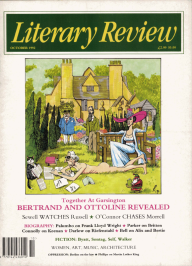Anthony Lee
Tricky Saint Dicky
Nixon: Ruin and Recovery, 1973-1990
By Stephen E Ambrose
Simon & Schuster 672pp £9.99 pbk
In 1988, NBC TV’s John Chancellor asked Richard Nixon how history would remember him. ‘History will treat me fairly. Historians probably won’t because most historians are on the left.’ Sadly, Stephen Ambrose does not include this illuminating exchange in the final volume of his three-part Nixon biography, but I hope that its subject is suitably munching his words, for his biographer achieves as even-handed an appraisal as Tricky Dicky is likely to see in his over-eventful lifetime.
‘I have loved writing this book,’ says Ambrose in his foreword, but it is the fervour neither of fan nor assassin. The more anyone studies Richard Nixon, the harder it is not to admire his tenacity, if not his tone. By 1990, Nixon the embattled President and unindicted Watergate co-conspirator

Sign Up to our newsletter
Receive free articles, highlights from the archive, news, details of prizes, and much more.@Lit_Review
Follow Literary Review on Twitter
Twitter Feed
Under its longest-serving editor, Graydon Carter, Vanity Fair was that rare thing – a New York society magazine that published serious journalism.
@PeterPeteryork looks at what Carter got right.
Peter York - Deluxe Editions
Peter York: Deluxe Editions - When the Going Was Good: An Editor’s Adventures During the Last Golden Age of Magazines by Graydon Carter
literaryreview.co.uk
Henry James returned to America in 1904 with three objectives: to see his brother William, to deliver a series of lectures on Balzac, and to gather material for a pair of books about modern America.
Peter Rose follows James out west.
Peter Rose - The Restless Analyst
Peter Rose: The Restless Analyst - Henry James Comes Home: Rediscovering America in the Gilded Age by Peter Brooks...
literaryreview.co.uk
Vladimir Putin served his apprenticeship in the KGB toward the end of the Cold War, a period during which Western societies were infiltrated by so-called 'illegals'.
Piers Brendon examines how the culture of Soviet spycraft shaped his thinking.
Piers Brendon - Tinker, Tailor, Sleeper, Troll
Piers Brendon: Tinker, Tailor, Sleeper, Troll - The Illegals: Russia’s Most Audacious Spies and the Plot to Infiltrate the West by Shaun Walker
literaryreview.co.uk